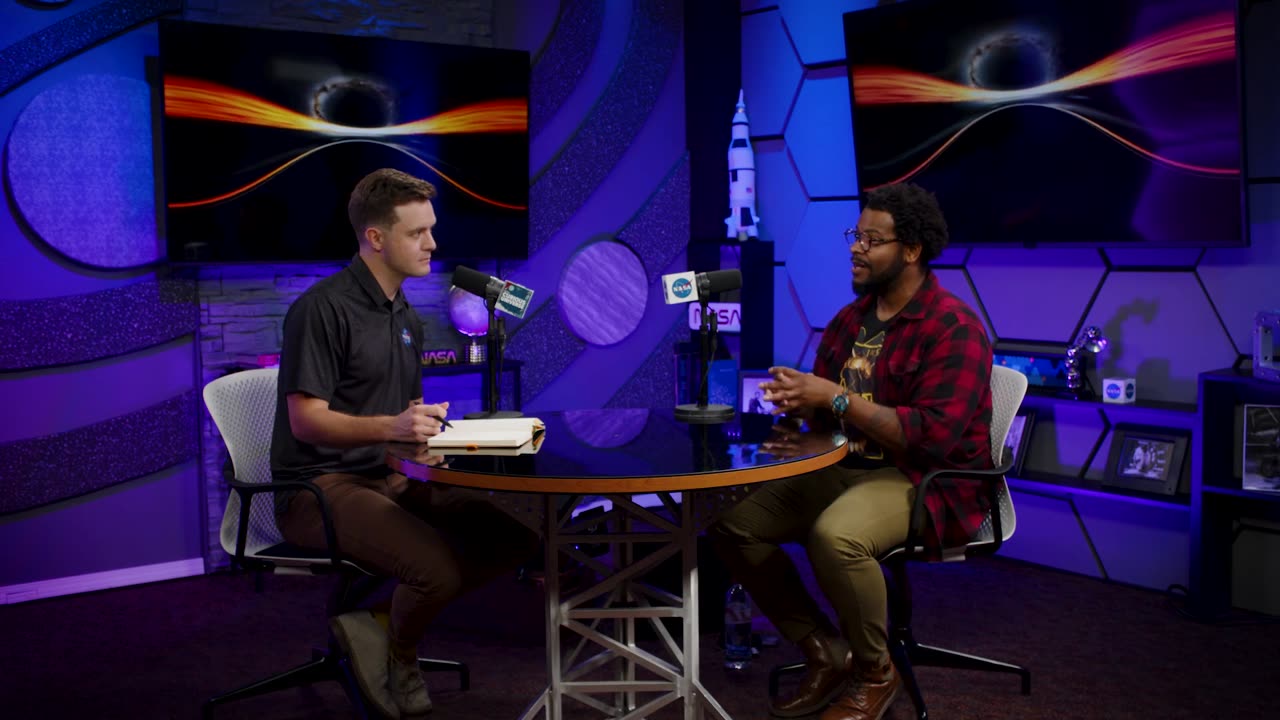Premium Only Content

NASA's Curious Universe: The Mind-bending Math Inside Black Holes
#BlackHoles #NASA #Podcast
Black holes are mysterious, far away, and can bend the fabric of reality itself—but we're learning more about them all the time. Ronald Gamble, a NASA theoretical astrophysicist, uses math, computer coding, and a dash of creativity to peer inside some of the universe's most extreme objects. We'll explore what it would feel like to get pulled into a black hole and what people get wrong about black holes. And we'll answer questions from curious listeners, including, "What would happen if a black hole ate nothing but magnetized material?"
Episode transcript available: https://www.nasa.gov/podcasts/curious...
Introducing NASA’s Curious Universe!
Get curious with NASA. As an official NASA podcast, Curious Universe brings you mind-blowing science and space adventures you won’t find anywhere else. Explore the cosmos alongside astronauts, scientists, engineers, and other top NASA experts who are achieving remarkable feats in science, space exploration, and aeronautics. Learn something new about the wild and wonderful universe we share. All you need to get started is a little curiosity.
NASA’s Curious Universe is an official NASA podcast hosted by Padi Boyd and Jacob Pinter
Discover more ad-free, original NASA shows at nasa.gov/podcasts
Find the full NASA’s Curious Universe catalog at nasa.gov/curiousuniverse
Credit: NASA's Goddard Space Flight Center
Music: "Curiosity" by SYSTEM Sounds [Matt Russo and Andrew Santaguida]
Executive Producer: Katie Konans
Producer/Host: Jacob Pinter
Videographer: Rob Andreoli
Videographer: John Philyaw
Video Editor: Scott Wiessinger
This video can be freely shared and downloaded at https://svs.gsfc.nasa.gov/14737. While the video in its entirety can be shared without permission, the music and some individual imagery may have been obtained through permission and may not be excised or remixed in other products. Specific details on such imagery may be found here: https://svs.gsfc.nasa.gov/14737. For more information on NASA’s media guidelines, visit https://nasa.gov/multimedia/guidelines.
#NASA #Podcast #BlackHoles
Transcript:
0:01
Hey, space nerds.
0:02
Jacob: This is a special video episode of NASA's podcast, Curious Universe.
0:07
We have so many more stories for you to discover.
0:10
So choose your adventure at NASA.gov/Curious Universe.
0:15
All right, let's go.
0:16
I just want to get straight into the fun stuff.
0:18
So, like, if you and I are in a spaceship and we're headed straight toward
0:22
a black hole.
0:24
Like, what is that going to be like for us?
0:26
Like, what's happening?
0:28
Ronald: It's going to get weird really fast.
0:29
Okay.
0:31
[Music ]
Welcome
0:36
Jacob: Our universe is a wild and wonderful place.
0:39
And in this podcast, NASA is your tour guide.
0:42
I'm your host for today, Jacob Pinter.
0:44
In this episode, buckle up because we're diving into black holes.
0:49
They are some of the most mysterious objects in the universe.
0:54
Ronald Gamble will help us understand what we know about black holes
0:57
and what's left to find out.
1:00
We'll debunk some of the biggest myths about black holes,
1:04
and we'll answer some burning questions sent in by you, the listeners.
What is a black hole
1:10
Ronald Gamble is
1:11
a theoretical astrophysicist at NASA.
1:14
Now, just to set the record straight, he hasn't actually been inside a black hole.
1:18
No one has.
1:19
But as a NASA astrophysicist, Ronald knows
1:22
what's going on in there better than just about anybody.
1:26
Ronald: A black hole is a is a region of space time, right?
1:30
Jacob: Yeah.
1:30
Ronald: You know, space and time where the gravity is kind of so immense,
1:35
where planets, stars, galaxies, smaller
1:38
galaxies, even light, photons, can't escape out.
1:42
And they are very, very complex objects, but they're very simple at the same time.
1:48
Jacob: Now, we still have tons of questions about how black holes work.
1:52
But thanks to physicists like Ronald, we're learning more about them all
1:56
the time.
1:57
Ronald is one of those scientists who is constantly surrounded
2:00
by long strings of numbers.
2:03
Ronald: The best
2:04
way I can describe it research-wise, is if you see ... picture
2:07
Einstein or somebody at a chalkboard writing all these equations, that's
2:11
what I literally do all day.
2:13
A lot of math. It's a lot of science.
2:15
But kind of finding ways to mash those things together.
2:18
Physics, quantum physics,
2:20
electromagnetism, space-time, relativity, all of that
2:24
all together kind of gives you an idea of what's happening around black holes.
2:29
Jacob: The math tells us that as we approach a black hole
2:32
in our hypothetical spaceship, we will pass a point of no return.
2:37
Now, black holes rotate, just like planets or stars.
2:41
And once we get close enough, we start to rotate along with the black hole.
2:46
It's like we're stuck on some kind of interstellar merry-go-round.
2:50
So space-time is literally being dragged around.
2:52
You have no choice.
2:53
Jacob: Okay.
2:53
Ronald: Reality itself is being dragged around the black hole.
2:56
Jacob: Okay.
2:57
Ronald: But as you get closer, then you'll approach something called the event
3:00
horizon. And right on the edge before that,
3:04
if someone were watching you, right? I always make the joke of throwing
3:07
my brother into a black hole. Sorry.
3:10
You’re the tester.
3:11
But he would freeze on the surface.
3:14
There would be a point.
3:14
And we call that an infinite redshift
3:16
surface where the light that's emitted from you stops.
3:20
Jacob: Wow. Ronald: That's it.
3:22
So that's the last image that you will see, right, of us going into the black hole.
3:28
Jacob: From there,
3:29
our trip only gets more bizarre, and probably more scary.
3:33
Depending on the size of the black hole,
3:35
we may go through a process called spaghettification.
3:39
That means the black hole put so much force on us
3:42
that our bodies stretch way out ... like noodles.
3:46
Ronald: We don't know what's inside. Jacob: Sure.
3:48
Ronald: Maybe my old quantum homework is in there.
3:52
You are under a lot of gravitational pressure,
3:54
meaning all of the gravitational force that is a black hole is now on top of you.
3:59
And you’re continuing to fall, fall closer and closer to the singularity or what
4:03
we would then consider the center of the black hole, which again,
4:07
you are falling an infinite amount of space.
4:10
So space-time inside of a black hole behaves very different
4:15
than it does outside.
4:16
Jacob: As we fall toward infinity,
4:18
it may get extremely bright and incredibly hot.
4:23
And then it's like someone flipped a switch.
4:26
No more light.
4:27
And after that, no one knows.
4:31
Ronald: If we could go there, I
4:32
please collect some information and send it back.
How to study black holes
4:37
Jacob: Now, there are some obvious challenges to studying black holes.
4:41
They're far away.
4:42
No light can escape them, and in many ways they're just weird.
4:48
But we manag to learn about them in two main ways:
4:51
We gather observational data, like looking through a telescope.
4:55
We can observe how the stuff around black holes behaves.
4:58
That's because it puts out types of light our eyes can't see,
5:02
including X-rays and radio waves.
5:04
We can study those.
5:06
And then we have theory: using math and physics to unpack what's going on
5:11
in there.
5:12
So black hole researchers actually have a lot to work with.
5:16
And we find black holes all over the universe.
5:19
Some are about the same mass as our sun.
5:22
Others are much, much larger.
5:25
Take our own Milky Way galaxy: in the center,
5:28
which, don't worry, is too far away to cause us harm here on Earth,
5:32
there is a supermassive black hole.
5:34
It's about the mass of 4 million suns, and other black holes are even bigger.
5:40
Ronald Gamble studies black holes
5:42
with a blend of old fashioned math and computer based modeling.
5:46
He knows a dozen different coding languages,
5:48
and he's also a mentor to young scientists trying to break into the field.
5:52
So I wanted to back up and hear where he started.
5:56
I was hoping that you can tell me kind of your superhero origin story.
6:01
Like, when did you realize that astrophysics
6:04
and black holes were going to be, like, your thing?
6:08
Ronald: My mom would say four years old.
6:11
I would say there's a villain arc in there somewhere.
6:14
But, yeah, four years old, I'm in front of my solar system.
6:18
A little placemat.
6:19
Probably tossin’ my mashed potatoes somewhere
6:22
and I'm asking my mom “does the Sun have fire?”
6:24
So, at four years old.
6:26
So I'm like, Okay.
6:27
She's like, okay, I need for you to be in camps somewhere.
6:30
I watched Carl Sagan, I watched Bill Nye,
6:34
and then things like Magic School Bus, it just kept getting more curious
6:39
and more curious, and I kept asking more questions.
6:43
So that's how I got into it.
6:44
And then I discovered all the things that we didn't know.
6:46
Jacob: Yeah. Ronald: about the universe.
6:48
I'm like, Okay, well, I'm going to study those. Jacob:Yeah.
6:50
Ronald: What's dark matter?
6:51
What's dark energy? What's ... There's new stuff about black holes
6:54
we have to discover.
6:55
So that's, that's how I'm in this.
6:58
It's a lot of fun.
6:59
Jacob: I think a lot of us have a hard time picturing
7:02
how researching black holes actually works.
7:06
Like, I'm not very good at math, if I'm honest, I can't code.
7:08
I'm just wondering if you can kind of put me in your shoes for, like,
7:12
a typical day or a typical project.
7:15
Ronald: Yeah.
7:16
So right now I'm working on a code
7:21
that's going to describe or simulate how high energy particles like electrons
7:26
kind of rotate around the black hole and then get blasted off in a jet.
7:29
Jacob: Okay. Yeah.
7:30
Ronald: So part of that work involves looking at plasma physics.
7:33
It looks looking at
7:36
kind of numerical calculus.
7:38
So that’s kind of doing calculus on the computer.
7:40
But then also, how do I incorporate
7:43
those very theoretical things with the observational data?
7:46
Jacob: Yeah. So tell me more about like that, that
7:50
that difference of that breakdown between observational and theoretical.
7:54
Because I think, again, for those of us on the outside,
7:57
black holes are just so
8:00
they're so spooky and so mysterious that it's it can be hard for us
8:04
to tell what we have observed, you know, in the data for sure.
8:09
And then what people like you are theorizing in,
8:12
you know, in your through math equations on your chalkboard and so forth.
8:16
Ronald: Yeah. So we have to ...
8:19
The first thing I'll say is black holes are actually very simple.
8:21
So we only need about three or four numbers to actually describe a black hole.
8:26
Mass, spin, might be the area of the event horizon.
8:30
Right. And the charge.
8:33
So black holes do have some charge on the surface, but that's it.
8:37
Jacob: Charge like positive, negative? Ronald: Positive or negative,
8:40
you can think of a charge collecting around a black hole.
8:43
Kind of like static charge. Well, it's collecting up, right?
8:45
But those four numbers are kind of what
8:49
we use to kind of funnel in our observational data.
8:53
And then how do folks like you take that and kind of run with it and theorize, you know?
8:58
Ronald: We do... Jacob: the next part. Ronald: what's called bad math, and then we correct with good math
9:04
that's called modeling.
9:05
So we, we work to kind of fill in the gaps for that observational data
9:09
and we again, it's as simple as turning the crank on the math.
relativistic jets
9:12
Jacob: As we keep cranking through the math,
9:15
we're finding new ways that black holes can surprise us.
9:19
Once matter or light falls into a black hole, it doesn't come out.
9:23
That's what makes them black.
9:25
But just outside the black hole, there's a swirling disk of hot, bright gas.
9:31
Most of that gas ends up inside the black hole, but not all of it.
9:36
Some of the gas shoots off, racing away at almost the speed of light in a stream
9:41
that can be incredibly long, like millions of light years.
9:46
Those streams are called relativistic jets.
9:49
And when one of those jets happens to point straight at Earth,
9:52
we give it a special name:
9:54
Blazar!
9:55
Ronald: You can think of them as kind of black-hole lasers or lighthouses.
9:58
Jacob: Okay. Ronald: Right?
9:59
So they're coming not inside the black hole because nothing can come out.
10:02
Jacob: Yeah Ronald: But they're coming right off the surface.
10:04
Right?
10:05
Part of the reason why they get blasted off is due to the magnetic
10:09
fields around black holes, and there's hot plasma
10:12
and everything kind of circling around like a soup.
10:15
Eventually it will spew out and that is what a jet is.
10:19
There are still unknown questions as to why the black hole spews a jet out
10:25
and why these particles go from zero to light speed in an instant.
10:29
Jacob: Wow. Ronald: Yeah.
10:30
So that's part of my research: trying to figure out the why.
10:33
Jacob: Maybe this is a weird question.
10:35
You tell me, but do you have a favorite black hole?
10:38
Ronald: I do, yeah.
10:40
Yeah. So, well I have
10:42
two favorites right now. Jacob: Okay.
10:44
Ronald: One is – and I'm going to give you the catalog name–
10:48
Jacob: Please.
10:48
Ronald: We don't have formal names. Jacob: I'll, I'll look it up.
10:50
Ronald: One is M87. So you might have heard about
10:52
M87
10:53
Sag A*, is the black hole at the center of our galaxy,
10:56
but M87 is kind of a, what I call a well-behaved black hole
10:59
Jacob: Okay. Ronald: It’s playing nice.
11:00
It’s very tilted at a nice angle for us to observe.
11:03
Jacob: Okay.
11:03
Ronald: Giving us great data, but the other one
11:06
is called TSX 0506 +056.
11:09
Jacob: Okay. Ronald: That's a lot of stuff there. Jacob: Sure.
11:12
Ronald: But it is a very high energetic,
11:14
very variable blazar that is giving us weird data.
11:19
It's blowing everything off the charts.
11:21
It's very ... it's extremely bright.
11:23
It's one of the brightest things you might see in the sky.
11:25
Jacob:Wow. Ronald: With your telescope, Of course.
11:27
Jacob: Sure. Sure. Ronald: It’s very far away, but
11:29
It is giving us some really cool data, some really cool physics.
11:32
Jacob: Cool.
11:34
You know, black holes are super, super popular.
11:37
Like we get questions about black holes
11:39
all the time, which we're going to ask you a few of.
11:40
But it makes me wonder, are there any misconceptions
11:44
about black holes that you hear a lot that you keep having to clear up?
11:48
Ronald: I’m so glad you asked. Jacob: Yeah.
11:50
Ronald: One of the ... one of the ... I would say the the most widely known misconception
11:56
is when you type in black hole on Google and you might see like a funnel picture.
12:00
Jacob:Yeah. Ronald: Black holes are spheres. Jacob: Okay.
12:03
Ronald: So they're not a funnel. Jacob:Yeah.
12:04
Ronald: You can’t just fall into it.
12:07
It is it's a sphere.
12:08
So and not only is it a sphere, it's not a perfect sphere,
12:12
so it’s kind of flattened at the poles because it rotates so fast.
12:15
So you can think of it as kind of like a very fat football, right?
12:19
Jacob: Yeah. Okay. Ronald: Or an egg shape.
12:20
Jacob: Okay.
12:21
Ronald: From the top down, it looks like a circle.
12:24
It's got that symmetry, But from the side, it's flattened.
12:27
Jacob: Huh,wow.
12:28
Ronald: Yeah. Jacob: Trippy.
12:29
Ronald: Yeah.
12:31
[Music]
listener questions
12:37
Jacob: When it comes to black holes
12:38
Ronald is curious about pretty much everything.
12:41
But here on this show, we also like to know what you're curious about.
12:45
We want to hear what questions you would ask a NASA expert.
12:49
And it turns out a lot of you were curious about black holes.
12:52
So we picked some of our favorite listener questions
12:55
and I put Ronald in the hot seat.
12:58
The first question came from Ashley.
13:00
They listened to a previous episode of Curious Universe
13:03
called Inside a Black Hole.
13:05
In that episode,
13:06
we mentioned a quantum physics phenomenon called Hawking radiation.
13:10
It's named after the famous physicist Stephen Hawking.
13:13
The idea is that little by little black holes can actually evaporate,
13:18
although it would take something like trillions of years to disappear
13:21
completely, which is an almost impossibly long amount of time.
13:24
Anyway, Ashley wanted to know more about Hawking radiation,
13:28
and they also asked how a star or planet can orbit a black hole.
13:32
How can the black hole's gravity hold something in place?
13:35
Because wouldn't it simply suck in the planet
13:38
or star?
Hawking radiation
13:39
Ronald: Okay, so this is a two-parter
13:41
Jacob:Yeah, Ronald: Well, we can talk about Hawking radiation first
13:44
Jacob:Okay. Ronald: Because that's the fun one.
13:48
Without going into
13:49
too deep in the weeds for quantum field theory
13:52
hawking radiation, it is a quantum effect, but you are kind of looking at
13:57
what the thermal properties of the horizon looks like.
14:02
Right? So if I'm zooming in, not on the large scale, where planets, stars
14:05
and things get pulled in, but on the very, very small scale,
14:08
the particle scale, well, what happens around the black hole?
14:12
Some particles may fall in, some may get kicked out.
14:15
So we're now going more fundamental to the laws of thermodynamics.
14:19
Okay.
14:19
As they apply to black holes, hawking radiation is kind of an effect
14:24
of one of those laws where the entropy of a black hole cannot decrease.
14:29
But on the surface, what happens?
14:31
Well, that information can't get lost because it's in our universe.
14:34
Jacob: Okay
14:34
Ronald: We should still have access to it, but it gets thermally radiated.
14:38
Right.
14:38
But as you kind of radiate away, you're taking some energy away
14:42
from the black hole.
14:43
Eventually, that black hole area, it will shrink.
14:47
Jacob: Okay.
14:47
Ronald: The surface area should shrink and if it keeps doing and it keeps doing that,
14:50
the black hole will theoretically evaporate due to hawking radiation.
14:55
Now that timescales on the order of like
14:58
I don’t know,maybe 10 to the 64 years,
15:01
that's a long range.
15:02
Jacob: So don't wait, don't wait up. Ronald: Don’t wait around for it
15:05
But that's hawking radiation in a nutshell.
15:07
Jacob: Okay. Yeah, I understood that. I'm with you.
15:10
I'm tracking.
15:11
So let me let me get to the second part of her question, though, to make sure
15:14
Ashley walks away happy, She asked how a star or a planet can orbit a black hole.
15:19
Wouldn't the black hole simply suck in the planet or star?
15:22
Ronald: Not necessarily.
15:23
So it's kind of like the how the moon doesn't necessarily fall in towards the Earth
15:27
Jacob: Sure
15:28
Even though it's locked to the gravity of the Earth.
15:31
It carries enough angular momentum, enough spin
15:34
to orbit around the Earth and stay in that orbit.
15:37
So within the accretion disks of black holes.
15:40
You could have solar systems, you can have a bunch of ...
15:43
you could have thousands of stars,
15:44
especially supermassive black holes at the centers of galaxies.
15:47
They're just going to continue to kind of orbit around and orbit around.
15:50
They do pick up some heat, some speed and eventually the force of gravity
15:55
of the tidal forces, if you will, they will start to shred that star apart.
15:59
Well, and then and eventually it will fall into a black hole.
16:02
Black holes don't necessarily suck things in, they kind of pull them.
16:07
Jacob: I hope that answers Ashley's question.
16:09
All right, let's go to number two.
16:10
This is from Tijana.
16:12
“How do scientists at NASA overcome the challenges of studying
16:16
the vastness of space and gathering data from such distant objects?”
16:21
Ronald: That’s a very big question, Jacob: That’s a big question, yeah.
16:25
Ronald: I would say so.
16:25
Just like the podcast,we get curious. Jacob: Yeah. Ronald: Righ?
16:28
We get curious and we get creative.
16:30
So part of being an astronomer, an astrophysicist
16:34
and doing the work from the ground
16:36
and you're looking at things millions of light years away.
16:38
You have to get creative.
16:40
The universe is only sending us
16:42
a little bit teeny bit of information.
16:45
And what are we doing with that information?
16:47
Well, we're building things like Roman, James Webb, Habitable Worlds observatories
16:51
coming up, LISA, things like that, to gather
16:55
those little bits of information that we can get to give us large science.
16:59
So we are making giant leaps and bounds.
17:04
but part of that is getting younger people to get more interested in the science.
17:09
Give us more creative thoughts. Jacob: Yeah. Ronald: Right?
17:12
We need a diversity of thought
17:13
to kind of do NASA science and that's how we get it done.
17:16
Jacob: Yeah, great.
17:17
Well, here's our next question.
17:18
This one is from Rusty.
17:20
This is the one I'm most looking forward to.
Rusty Ashley
17:23
Rusty: Hello, my name is
17:24
Rusty Ashley, and I live close to Austin, Texas.
17:27
And my curiosity is if magnets were created in the Big Bang
17:31
and also what would happen if a black hole only
17:34
consumed magnetized material and nothing else?
17:37
Would that change their fundamental behavior in any way
17:41
compared to normal black holes?
17:44
Thank you.
Common Misconceptions
17:45
Ronald: So here's a common misconception.
17:47
Yeah, black holes actually only consume magnetized material.
17:51
Jacob: Oh!
17:52
Ronald: Because it's technically a plasma.
17:54
Jacob: Okay. Ronald: Which is magnetized.
17:55
Jacob: Okay Ronald: So if you take anything that has charge
17:58
and you’re rotating around in an orbit, it will create a magnetic field.
18:02
Jacob: Okay, Ronald: That's physics 101. Jacob: Yeah.
18:04
Ronald: So pretty much you can think of everything that falls in is kind of magnetized
18:08
to some extent.
18:09
now magnets being created at the Big Bang?
18:14
That is, that's an interesting question because one of the questions
18:18
that astrophysics ask is, well, where did all the magnetic fields come from?
18:23
From objects.
18:24
Things like pulsars, magnetars, which you can think of, like as a magnetic star.
18:29
Those are the strongest magnetic fields in the universe.
18:32
where do these things come from?
18:35
You have to go more fundamental than that.
18:36
So you have to look at the four fundamental forces of nature.
18:40
gravity, electromagnetism and the strong and weak nuclear forces.
18:44
All of those together have to combine.
18:45
They kind of squish together, right?
18:47
They kind of create a soup to give us things that do create magnetic fields.
18:52
There's a lot of physics
18:53
involved in the background, so I can't give you, like, the complete.
18:57
Jacob: Yeah, Ronald: big-picture cosmological answer, but
19:01
that’s why we have a field called physical cosmology.
19:04
Jacob: Okay.
19:04
Ronald: So that we can discover some of those things in the early universe.
19:08
Jacob: So the short answer is ... Ronald: The short answer is
19:09
Jacob: Stay tuned? Ronald: Stay tuned!
19:12
there's a Nobel Prize somewhere
19:13
Jacob: That's right.
19:17
so before we wrap up, there's a couple other things I want to ask you about.
19:21
One of them is art, because I have seen,
19:24
like art and graphics that you've made,
19:27
and I was just blown away like they were really good.
19:30
Ronald: Thanks. Jacob: How did you get started doing that?
19:32
Like, what is that side of you
19:33
Ronald: I have been probably doing art since I was a kid. In undergrad,
19:38
I majored, double majored in physics and fine art.
19:40
Jacob: Wow. Ronald: So I have a minor in fine arts.
19:42
Jacob: Okay.
19:42
Ronald: But it helps to kind of combine left and right brains.
19:45
Jacob: Yeah. Ronald: For me, I couldn't separate them
19:48
and it really helps kind of visualizing the science. Helps
19:51
you learn better to really visualize some of these complex things.
19:55
What is a, how do I draw a black hole?
19:57
Well, again, it's a sphere, but pinch it maybe.
20:00
Jacob: Yeah. Ronald: Right?
20:02
So it's those things, and then the math comes into play, right?
20:06
Jacob: Yeah. Ronald: Thank you, Pythagorean theorem.
20:08
for giving us triangles.
20:11
Jacob: I'm always really curious how people who are really good at science
20:14
bring in, like all of the rest of their lives into
20:18
that, like all of their other interests and the way that they tackle problems.
20:21
Like, do you think that being an artist or being interested in art
20:25
makes you a better scientist?
20:27
How do you how do you see that? Ronald: I think it does.
20:29
So, it ... me being in theory, I have to come up with new physics
20:34
or new ways to describe physics in very creative ways.
20:38
We have a finite amount of math and physics that we've discovered so far.
20:42
Jacob: Sure. Ronald: So we have to use it all, right?
20:44
So it's again, like a kind of
20:49
a chalkboard.
20:49
It's like a blank canvas for me.
20:51
You know. Well, I got to start from scratch.
20:54
I'm like, okay, well, one equation, it's like a Lego, and if I keep stacking,
20:57
I might build, you know, a DeLorean or
21:01
the Millenium Falcon or something.
21:03
And that's what we get.
21:04
And then I can break it apart and make something else.
21:07
Jacob: Yeah.
21:08
Ronald: And so I think being a good theorist, being a good scientist
21:12
requires an amount of right-brain creativity.
21:15
Jacob: Yeah.
21:16
Ronald: I think you need a very holistic view of science and how we do it.
21:20
Jacob: Yeah. Ronald: To be really creative. That's how you get the new stuff.
21:22
Jacob: Yeah Ronald: Yeah. Jacob: I know that
21:25
something else that's a big part of your job and I assume
21:29
just kind of like a passion project too, is, is mentoring people.
21:32
Why is that so important to you?
21:36
Ronald: My kind of mantra is kind of providing
21:39
the ... providing the world what I needed most when I didn't receive it.
21:44
So it's, mentoring to me is is giving the student,
21:48
you know, that that push, that motivation that inspiration, the recommendation
21:55
for lack of better words, the mentorship.
21:57
Jacob:Yeah, Ronald: Right? And the advocacy.
21:59
Some somebody in your corner cheering you on.
22:02
Right? Because I didn't have many mentors like that.
22:04
I had my few and they were fantastic.
22:08
But again, I didn't have many peers kind of doing that, right?
22:14
and then, you know, how do you build that confidence in.
22:17
In the field?
22:17
Astronomy and astrophysics is very ...
22:20
it can be very intense. Jacob: Yeah. Ronald: If you don't know how to navigate it.
22:22
So that's why I like to do mentorship.
22:25
Jacob: Yeah.
22:26
What is something that
22:28
that either early career scientists or students
22:33
or even kids should understand about your job
22:37
and what it takes to be successful in the kind of work that you do?
22:42
Ronald: It's plain and simple: don't stop.
22:44
And I would say like, don't stop, get it get it, but
22:50
quite literally, just don't stop.
22:52
Yes, there are going to be tons and tons of people that will tell you,
22:55
maybe you should choose something else that's a little bit more ...
22:57
you can be successful at it.
23:01
Or, or the likelihood of you being at NASA is actually very low.
23:05
Well, the likelihood of you actually getting NASA's not zero.
23:08
Jacob: Yeah. Ronald: Do it.
23:09
Jacob: Yeah.
23:09
Ronald: So that's the first very first thing I tell people.
23:15
Every talk that I give, I'm giving them.
23:16
Okay, this is where I started from.
23:18
If, if I could get out of here, you can get here too
23:23
But another thing
23:24
I will say is that again, not only just, you know, not stopping
23:29
but also not getting in the way of yourself.
23:32
and that, again, will drive you to keep doing it.
23:34
If you don't get it the first time, you might get it
23:36
the second, third, fourth, fifth, sixth time.
23:40
Right?
23:40
So I've applied to NASA, I think maybe four times.
23:43
Jacob: Wow. Ronald: And so you just have to keep being resilient and it will come.
23:47
You're like, if you keep working on your dreams, they will become reality.
23:52
Jacob: Ron Gamble, thank you so much.
23:53
This was so fun.
23:54
Ronald: Thanks,thanks for having me.
23:57
[Music plays in background] Jacob: Among his many titles, Ronald Gamble
24:00
is the director of a NASA program called Cosmic Pathfinders.
24:04
That's one way for students
24:05
or early-career scientists to get involved with NASA science.
24:09
And when it comes to black holes, there is a lot more to learn.
24:13
You can find more about NASA's black hole research at
24:16
science.nasa.gov/universe
24:19
And if you just scroll back through the Curious Universe feed,
24:22
you'll find an episode called Inside a Black Hole.
24:26
We would love to know
24:26
what you're curious about, about black holes or anything else.
24:30
So send us an email.
24:32
Our address is NASA-CuriousUniverse@mail.nasa.gov.
-
 38:07
38:07
Michael Franzese
1 hour agoLeaving Organized Crime and Uncovering Mob in Politics: Tudor Dixon and Michael Franzese
3521 -
 LIVE
LIVE
Jewels Jones Live ®
1 day agoAMERICA IS BACK | A Political Rendezvous - Ep. 111
1,452 watching -
 LIVE
LIVE
Due Dissidence
23 hours agoLIVE: Workers Strike Back Conference ft. Chris Hedges, Jill Stein, Kshama Sawant, and More!
1,794 watching -
 8:36:37
8:36:37
Right Side Broadcasting Network
5 days agoLIVE REPLAY: CPAC 2025 Day Three with President Donald J. Trump - 2/22/25
224K77 -
 1:05:34
1:05:34
The Big Mig™
9 hours agoConfirmed Kash Patel New FBI Director, Bring On The Pain |EP483
27.1K13 -
 53:59
53:59
Tactical Advisor
5 hours agoThe Vault Room Podcast 009 | Everyone Getting $5000?!
30.1K6 -
 2:04:44
2:04:44
TheAlecLaceShow
16 hours agoLive at CPAC | Interviews with Dean Cain, Rep. Comer and more! | The Alec Lace Show
41.3K3 -
 LIVE
LIVE
Major League Fishing
2 days agoLIVE Tackle Warehouse Invitationals, Stop 1, Day 2
240 watching -
 3:12:37
3:12:37
I_Came_With_Fire_Podcast
13 hours agoNOC Spy: CIA uses SATANIC RITUAL ABUSE to make SLEEPER Cells
29.4K5 -
 28:42
28:42
CatfishedOnline
1 day ago $1.67 earnedWoman Insists Morgan Wallen Relationship Isn't a Romance Scam!
24.6K